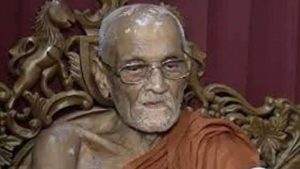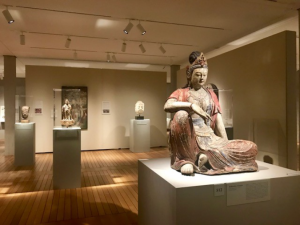
How are Amitabha’s 48 vows formulated and structured?
Shakyamuni Buddha spoke of his original intent of appearing in the world in the Infinite Life Sutra, with the scripture mainly discussing Amitabha’s deliverance through his vow power, which issues from his accomplishment of his 48 vows. Amitabha’s 48 vows are the blueprint for building his Pure Land, where all sentient beings of the 10 directions may easily be reborn and become Buddhas, free from the danger of retrogression.
How are Amitabha’s 48 vows formulated and structured? Most Dharma masters classify Amitabha’s 48 vows into three categories: those that describe Amitabha’s inconceivable powers as a Buddha, those that depict the splendours of the Land of Bliss, and those that highlight the benefits bestowed upon inhabitants and aspirants. Here is a typical classification:
1. Vows concerning Amitabha’s Dharma Body
2. Vows concerning Amitabha’s Pure Land
3. Vows concerning the benefitting and deliverance of sentient beings
However, Master Shandao, the de facto founder of the Pure Land school, categorizes the 48 vows differently. He considers the three categories as closely interrelated and mutually dependent. This is because the sole purpose of Amitabha’s accomplishment of his own Dharma Body and his Land is to benefit and deliver all suffering sentient beings who aspire to be reborn in his Pure Land and become buddhas.
All 48 vows are related to the Vow of Rebirth through Amitabha-Recitation
If any sentient being is unable to be reborn in his Pure Land with recourse to Amitabha’s vow power expressed in the 18th vow, the vow of rebirth through Name recitation, it is meaningless for Dharmakara, the former body of Amitabha, to attain perfect enlightenment and become a buddha.
Perceiving Dharmakara’s virtuous mind in making the 48 vows as expressed in the verse of Praising the Buddha (see my last article, “What Motivated Bodhisattva Dharmakara to Make the 48 Great Vows”), we should read the 48 vows all the way through from the perspective of Amitabha’s proactive, equal, and unconditional deliverance of all sentient beings in the 10 directions.
Amitabha’s 18th Vow is the common vow among all 48 vows
If we follow Master Shandao’s perspective in reading the 48 vows, we will easily understand why Dharmakara presents his 48 vows in this order. We also find that the 48 vows are coherent, and all are related to the 18th or Fundamental Vow, also known as the Vow of Rebirth by Amitabha-Recitation.
For instance, Amitabha’s first vow states:
“If, when I attain buddhahood, there should be in my land a hell, a realm of hungry spirits or a realm of animals, may I not attain perfect enlightenment.”
This seems to be a simple and straightforward vow, with nothing special distinguishing it. Almost every buddha makes this vow in his casual ground, like Akshobhya Buddha’s fifth vow.
However, if we understand why Amitabha Buddha positions this vow in preparing his master plan of deliverance, we should be deeply moved in understanding its significance. Dharmakara’s first priority is to deliver sentient beings who suffer most and also have the least capacity to leave this world of suffering because of their heavy karmic obstructions. We will discuss this further in the next article.
The 48 vows are not just separate statements unrelated to each other but should be regarded as a whole—a package deal—created by Amitabha Buddha for the benefit of all sentient beings. It also signifies that Amitabha’s 18th Vow is an unprecedented vow that surpasses and transcends the vows made by all previous buddhas.
Amitabha and reciter form an inseparable entity, like a magnet attracts a nail
Master Shandao says in his Commentary on the Contemplation Sutra, “Bhiksu Dharmakara practiced along the bodhisattva path at the time of Buddha Lokeshvararaja. He made 48 vows, and said in every single vow:
“If, when I attain buddhahood, sentient beings in the lands of the 10 quarters who aspire to be born in my land recite my name, even 10 times, and, should they not be born there, may I not attain perfect enlightenment.”
This means that the common bond uniting the 48 vows is the 18th Vow. Regardless of whether you are a human or celestial being, a sravaka or bodhisattva in the world of the 10 directions, as long as you are reborn in Dharmakara’s future buddha-land through name-recitation, you will receive the benefits as promised in each of the 48 vows.
Apart from delivering sentient beings to become buddhas through rebirth in his Pure Land, Amitabha Buddha has no other aim in making his vows. Apart from accepting Amitabha’s deliverance, sentient beings need not seek any other form of merit or virtue as this reward is unsurpassed.
Our rebirth relies on Amitabha’s fulfilment of his causal vows. Amitabha’s fulfilment of causal vows relies on our rebirth: whether we can be reborn in the Land of Bliss through Amitabha-recitation, as stated in his 18th Vow.
If we do not rely on Amitabha’s vow-power and his merit and virtues, we will not be able to be reborn in Pure Land and will continue to reincarnate within the Six Realms for long kalpas. However, Amitabha’s Fundamental Vow will eventually deliver even the most stubborn and difficult-to-save person. If it didn’t, he would not have accepted perfect enlightenment, even though he was fully qualified to become a buddha.
Amitabha Buddha pledges his achievement of buddhahood with rebirth of aspirants who recite his Name. So, Amitabha Buddha and the Amitabha-reciter are very intimate and close with one another, as Amitabha Buddha always stands beside the Amitabha-reciter. They form an inseparable entity, like a magnet attracts a nail.
If an Amitabha-reciter loses his faith, aspiration, and stops reciting Amitabha’s Name, or mixes in other practices with Amitabha-recitation, his intimate and close relationship is interrupted. Once a nail is detached and placed at a distance from the magnet, it will not feel the magnet’s powerful attracting force. Namo Amituofo!
Related features from Buddhistdoor Global
What Motivated Bodhisattva Dharmakara to Make the 48 Great Vows?
The Original Intent of Shakyamuni Buddha is to Extol Amitabha’s Name
“Do You Want to Become a Buddha Like Shakyamuni?” Asks Amitabha













